|
|
|
Sort Order |
|
|
|
Items / Page
|
|
|
|
|
|
|
| Srl | Item |
| 1 |
ID:
083605


|
|
|
| 2 |
ID:
117369
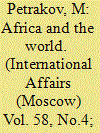

|
|
|
|
|
| Publication |
2012.
|
| Summary/Abstract |
FOR MANY DECADES, Africa was and still largely is a continent "full of problems." The problems of resolving existing conflicts and preventing new ones, and eradicating poverty, disease, social inequality, and illiteracy have always been especially acute in the African agenda. By no means all of them are resolved, or resolved to completion. But recent signs from the African South bear witness to an optimistic and ambitious vision for its future. RSA as the most economically developed country in Africa, projecting itself as a regional leader, generates political impulses aimed at strengthening Africa's overall position in the world, promoting regional integration and consolidating African identity as such.
|
|
|
|
|
|
|
|
|
|
|
|
|
|
|
|
| 3 |
ID:
101284
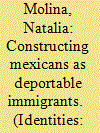

|
|
|
|
|
| Publication |
2010.
|
| Summary/Abstract |
This article draws on archival records of events in California's Imperial Valley in 1940 that resulted in the arrests and deportation of a group of Mexican workers, some of whom were known union activists. The workers had entered the country lawfully and had lived in the United States for years. These immigrants were nevertheless vulnerable because they were receiving treatment for a communicable disease. This, according to immigration officials, rendered them "likely to become a public charge" (LPC), a deportable offense. Officially designating Mexicans as LPCs discredited them at the same time that it circumvented any discussion of possible violation of labor rights or civil rights, both key aspects of government-sponsored reform efforts underway at the time. Constructions of subjects as illegal, diseased, and threats to the nation-state came together in such a way that provided a surefire formula for marking Mexicans as deportable.
|
|
|
|
|
|
|
|
|
|
|
|
|
|
|
|
| 4 |
ID:
095036
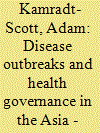

|
|
|
| 5 |
ID:
095367
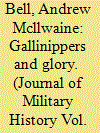

|
|
|
|
|
| Publication |
2010.
|
| Summary/Abstract |
Disease killed tow thirds of soldiers who died during the civil war. And of the various maladies that plagued both armies, few were more pervasive than malaria - a mosquito borne illness which affected over1.1 million soldiers serving in the Union ranks.
|
|
|
|
|
|
|
|
|
|
|
|
|
|
|
|
| 6 |
ID:
118712
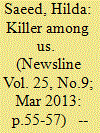

|
|
|
| 7 |
ID:
080157
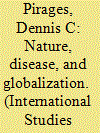

|
|
|
| 8 |
ID:
089140
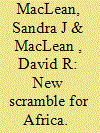

|
|
|
|
|
| Publication |
2009.
|
| Summary/Abstract |
At population levels, health outcomes are determined more by social conditions than by either biology or technological interventions. Therefore, entrenched and increasing inequalities associated with global transformations in political economy are among the most significant causal factors for so-called 'global health' problems that disproportionately afflict sub-Saharan Africans. Growing attention is being paid to the social causes of ill health, as evidenced in the WHO's recently introduced Commission on the Social Determinants of Health. However, the predominant paradigm continues to support a biotechnical/clinical health model that privileges pharmaceutical treatment of individual diseases over support for broader social change that would include improved broadly based national health systems as well as revised international economic structures. This paper examines the struggle involved in setting the normative framework for health in sub-Saharan Africa and the roles of major external actors in setting the policy agenda
|
|
|
|
|
|
|
|
|
|
|
|
|
|
|
|
| 9 |
ID:
155940
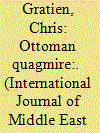

|
|
|
|
|
| Summary/Abstract |
During the late Ottoman period, a large influx of migrants and the expansion of cultivation created opportunities for new settlements in the countryside of Anatolia, Greater Syria, and Iraq. However, settlement often brought misery to newcomers in the form of malaria, especially when it occurred in the lowlands of the Mediterranean. This article traces the contours of the encounter with malaria that arose out of settlement, offering an overview of how Ottoman state and society confronted the conundrum of the swamp and examining the impact of this confrontation on local political economies. It demonstrates that swamps and malaria were a significant concern for late Ottoman state and society, and that policies adopted to address malaria sometimes facilitated the creation of large estates in the countryside of the Mediterranean littoral.
|
|
|
|
|
|
|
|
|
|
|
|
|
|
|
|
| 10 |
ID:
127780
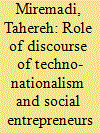

|
|
|
|
|
| Publication |
2014.
|
| Summary/Abstract |
This paper discusses the role of social entrepreneurship and the discourse of techno-nationalism in defining national selfhood in contemporary Iran. To examine the issue, this paper develops an in-depth case study of the development of stem cell research, and shows how an alliance between the leaders of the scientific community and Iran's politico-religious authority contributed to building technological capacity in the field of stem cell research in the first decade of the twenty-first century. The paper also highlights how the preliminary success of stem cell research, along with other knowledge-intensive technologies, has created a shared feeling of national pride and has served as the material base for the contemporary discourse of techno-nationalism. The paper concludes with the notion that the techno-nationalist discourse has the inherent potential to unwittingly help to redefine the dichotomy between Iran and the West in such a way that it becomes less antagonistic, should other factors permit.
|
|
|
|
|
|
|
|
|
|
|
|
|
|
|
|
| 11 |
ID:
124512
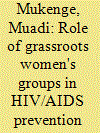

|
|
|
|
|
| Publication |
2013.
|
| Summary/Abstract |
The unique experiences of women and girls in conflict situations have been highlighted in key research over the past two decades,1 warranting the need for a gendered approach in post-conflict reconstruction processes. This article focuses on the emergence of HIV in such settings and highlights the contributions of women's groups to HIV interventions and policy formulation, using case studies from Sierra Leone and the Democratic Republic of the Congo (DRC). The article argues for the need for a much deeper gender analysis in HIV intervention strategies, and concludes with recommendations to ensure access to justice and health services for women.
|
|
|
|
|
|
|
|
|
|
|
|
|
|
|
|
| 12 |
ID:
101739
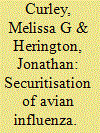

|
|
|
|
|
| Publication |
2011.
|
| Summary/Abstract |
Infectious disease outbreaks primarily affect communities of individuals with little reference to the political borders which contain them; yet, the state is still the primary provider of public health capacity. This duality has profound effects for the way disease is framed as a security issue, and how international organisations, such as the World Health Organization, assist affected countries. The article seeks to explore the role that domestic political relationships play in mediating the treatment of diseases as security issues. Drawing upon an analysis of the securitisation of avian influenza in Vietnam and Indonesia, the article discusses the effect that legitimacy, competing referents and audiences have on the external and internal policy reactions of states to infectious diseases, specifically in their interpretation of disease as a security threat. In doing so, we extend upon existing debates on the Copenhagen School's securitisation framework, particularly on the impact of domestic political structures on securitisation processes in non-Western, non-democratic and transitional states.
|
|
|
|
|
|
|
|
|
|
|
|
|
|
|
|
| 13 |
ID:
081389
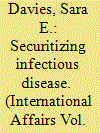

|
|
|
|
|
| Publication |
2008.
|
| Summary/Abstract |
Over the past decade there has been an increased awareness in the field of international relations of the potential impact of an infectious disease epidemic on national security. While states' attempts to combat infectious disease have a long history, what is new in this area is the adoption at the international level of securitized responses regarding the containment of infectious disease. This article argues that the securitization of infectious disease by states and the World Health Organization (WHO) has led to two key developments. First, the WHO has had to assert itself as the primary actor that all states, particularly western states, can rely upon to contain the threat of infectious diseases. The WHO's apparent success in this is evidenced by the development of the Global Outbreak Alert Response Network (GOARN), which has led to arguments that the WHO has emerged as the key authority in global health governance. The second outcome that this article seeks to explore is the development of the WHO's authority in the area of infectious disease surveillance. In particular, is GOARN a representation of the WHO's consummate authority in the area of coordinating infectious disease response or is GOARN the product of the WHO's capitulation to western states' concerns with preventing infectious disease outbreaks from reaching their borders and as a result, are arguments expressing the authority of the WHO in infectious disease response premature?
|
|
|
|
|
|
|
|
|
|
|
|
|
|
|
|
| 14 |
ID:
068637
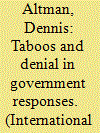

|
|
|
| 15 |
ID:
068251
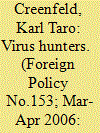

|
|
|
| 16 |
ID:
133680
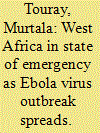

|
|
|
|
|
| Publication |
2014.
|
| Summary/Abstract |
The World Health Organization (WTO) declared on 8 August that the Ebola virus disease (EVD) outbreak in West Africa was "an international emergency" since the outbreak began, more than 1800 cases of EVD have been identified (Including new, confirmed, probable, and suspected cases) in Guinea, Liberia, Nigeria and Sierra Leone of which more than 1000 produced fatalities
|
|
|
|
|
|
|
|
|
|
|
|
|
|
|
|
| 17 |
ID:
124717
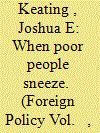

|
|
|
|
|
| Publication |
2013.
|
| Summary/Abstract |
Analysts often borrow from the vocabulary of disease to describe financial crises, using word such as "pandemic" and "contagion" to discussed how economic disturbance spread. But recent research suggests a more literal connection between the two : poor countries, actual disease can infect the financial system.
|
|
|
|
|
|
|
|
|
|
|
|
|
|
|
|
| 18 |
ID:
125313
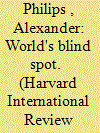

|
|
|
|
|
| Publication |
2013.
|
| Summary/Abstract |
Children starve. Young girls sell their bodies to eat. There is no clean drinking water. There are no doctors. Refugees are not allowed to leave the camps. As the rainy season approaches, waterborne diseases will spread like wildfire. This is the plight of the over 200,000 Rohingya who survive in makeshift refugee camps along the Myanmar's border with Bangladesh. Although their situation is dire, they are better off than the Rohingya being slaughtered back in Myanmar. According to the United Nations, the Rohingya are the world's most ignored and persecuted minority. They have faced decades of neglect and dehumanization while the world stands by; it is time for the response of the international community to change. The situation in Myanmar has reached a tipping point and the country is a tinderbox, ready to ignite into violence. The inaction of the international community has allowed the persecution of the Rohingya Muslim minority to escalate into state-sponsored ethnic cleansing and a spreading humanitarian crisis in Myanmar's western Rakhine state
|
|
|
|
|
|
|
|
|
|
|
|
|
|
|
|
|
|
|
|
|